Our stomach pain from all the mooncakes we ate during Mid-autumn festival hasn’t even cleared up yet and we are already preparing for the next big holiday. No mooncakes this time, but colourful red yellow-starred flags lining the streets. One of China’s most important holidays is coming up, and it is not without reason that it is called the Golden Week National Holiday. This is the birthday of the PRC (People's Republic of China), and not any birthday, this year we are celebrating the PRC’s 70th anniversary!
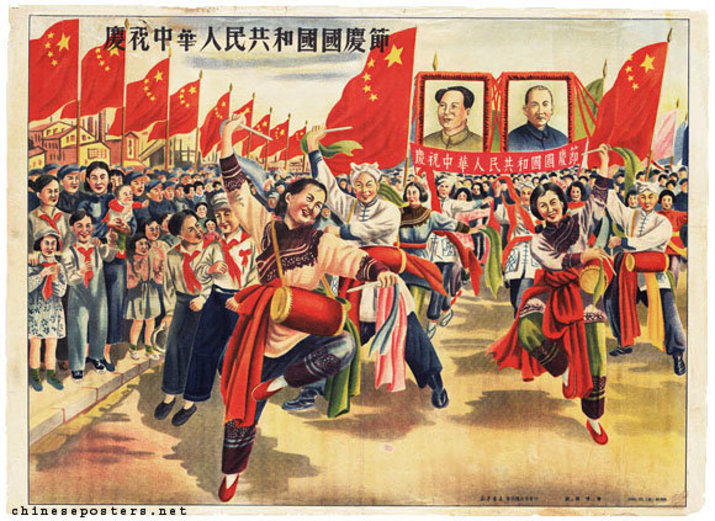 Chinese propaganda poster of the parade with traditional drum dancers - IISH, Stefan R. Landsberger
Chinese propaganda poster of the parade with traditional drum dancers - IISH, Stefan R. Landsberger
Throughout the history of China, the National Day has also been celebrated in ancient times, it can be originated back to the Western Jin dynasty (265-316). Back then, it was celebrated as a birthday event of a feudal emperor. However, in today's PRC, guóqìng jié (simplified Chinese: 国庆节. Traditional Chinese: 國慶節), is celebrated on the first of October, to honour the foundation of the new government after defeating the Kuomingtang (The Nationalist Party of China) in the Chinese civil war (1927-1949). As Mao Zedong declared the victory of domestic unrest and entered a new era of modern Chinese history, the birth of the new government is celebrated annually as a national holiday. In today's China, many people view the National Day of PRC as a 7-day long holiday away from duties at work or studies, which brings an opportunity to enjoy a week of travelling or staying at home with the family. This week of the public holiday is more known as one of the two "Golden Weeks" in China, the second-longest holiday after the 15-day long holiday during the Chinese New Year.
As you can imagine, this year's celebrations will be extra extraordinary in terms of festivities and other activities to honour the past 70 years of economic development and social progress in the country. It was 70 years ago Mao Zedong declared the birth of the new socialist era in China. Since 2000, the National Day of PRC has been a public holiday for the majority of its citizens. The Chinese government aims to celebrate 1st October under a blue sky free of smog from industries around Beijing.
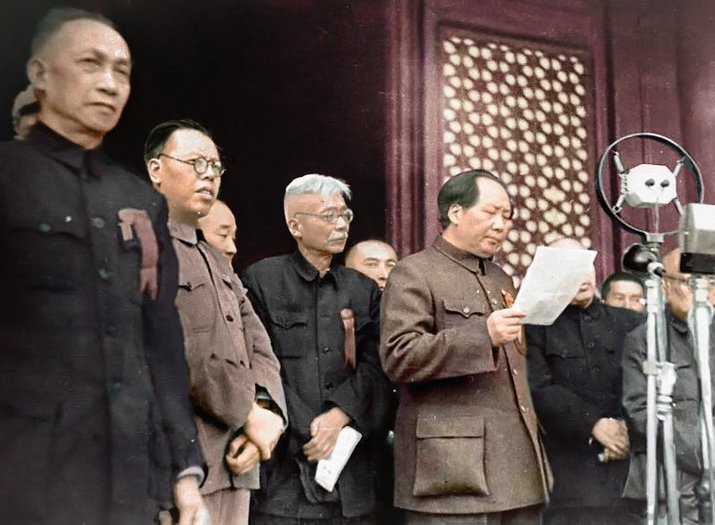 The Chairman of China, Mao Zedong proclaiming the People’s Republic of China on 1st October 1949
The Chairman of China, Mao Zedong proclaiming the People’s Republic of China on 1st October 1949
The first National Day of PRC was held in Tiananmen Square in Beijing, the capital city of China, in front of 300,000 people and soldiers, and it was at that time Mao Zedong pushed a button that raised the five starred PRC flag. From that day, the five-star flag became the official flag of China. The flag has five stars located on the upper-left corner, one big star that represents the government with four smaller stars that represent a connection to the people, the citizens of China. The meaning of the five stars is the unity of its citizen with the leadership of China.
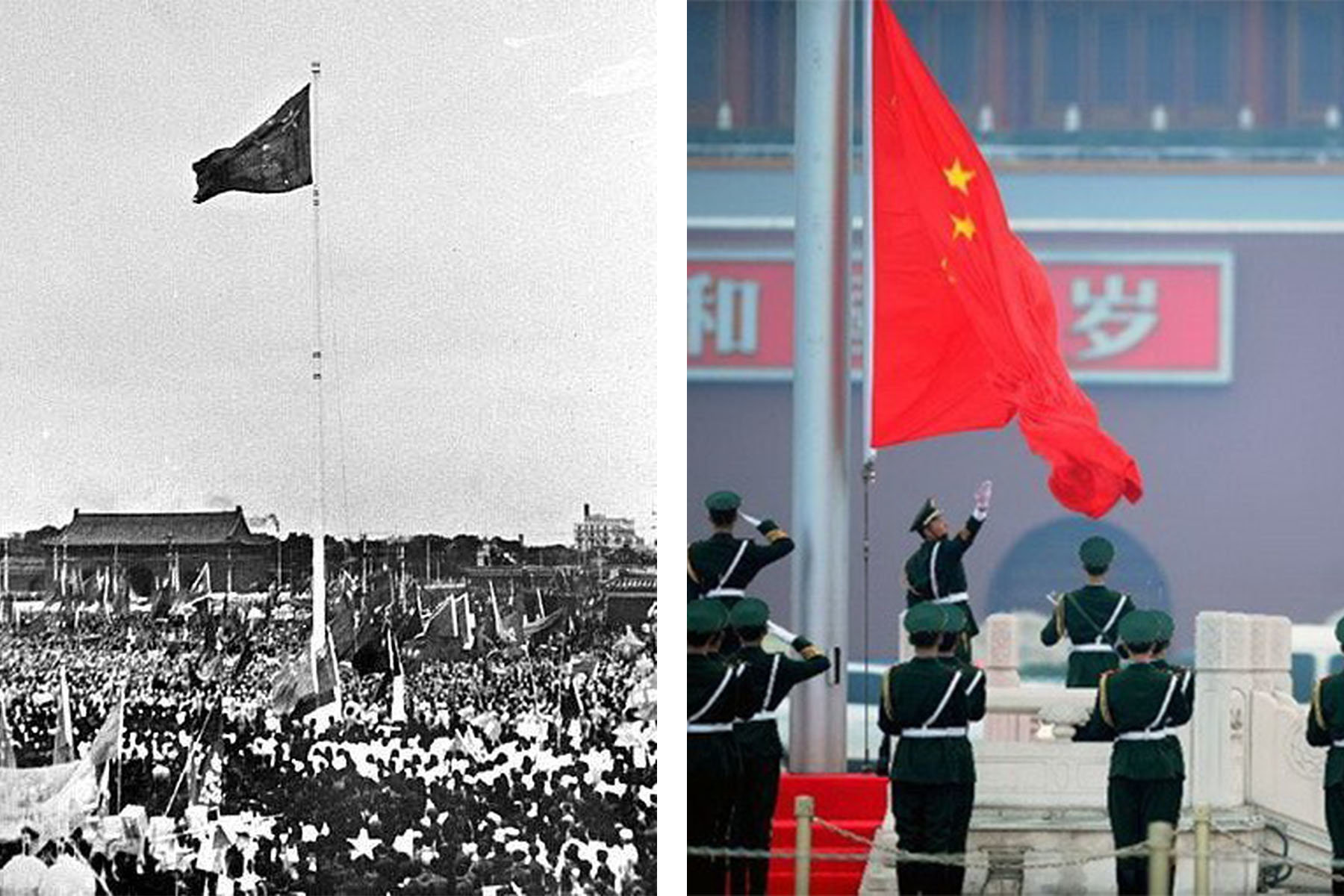 Tiananmen Square, October 1, 1949, Mao Zedong pushed a button that raised the five-star flag, which became the official flag of China a few days earlier. Until this day, the flag is ceremonially raised at Tiananmen Square at sunrise every day.
Tiananmen Square, October 1, 1949, Mao Zedong pushed a button that raised the five-star flag, which became the official flag of China a few days earlier. Until this day, the flag is ceremonially raised at Tiananmen Square at sunrise every day.
From the year 1949 onward, the Chinese National Day was celebrated every year with military parades at Tiananmen Square. After the year 1959, the government decided to spend its expenses more wisely due to the consequences of the Great Leap Forward. It wasn’t until 1984 that the people in Beijing could witness the spectacles of a military parade again, on China's 35th anniversary of celebrating the birth of the socialist era. Previously, China has held two big military parades, on its 50th and 60th anniversary, so this year's 70th anniversary's military parade is expected to be the biggest throughout China’s contemporary history.
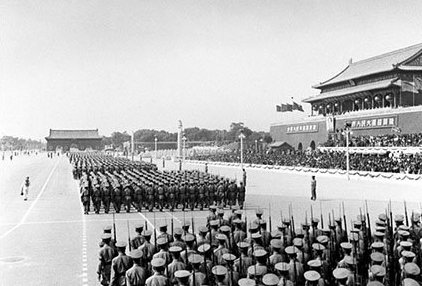
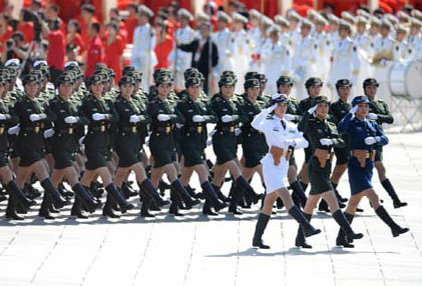
Left: October 1, 1950, the first-anniversary parade on National Day. Right: October 1, 2009, the women of China’s military proudly join the big parade
The preparations and arrangements for the upcoming celebration of the 70th anniversary have been emphasized to display the international role China has undertaken as a military power, yet also displays China’s accomplishments in creating a better national defense and military forces from 1949 till present time. Thus the military parade itself is an important celebration for China’s national pride and does not target any specific country or specific political situation between countries. Interestingly, the upcoming celebration will be China's 18th military parade and the 15th National Day parade since 1949.
The military parade on the National Day starts at 10 a.m., on the 1st October, on Tiananmen Square, and the entire parade will showcase for about 80 minutes. The celebration starts with raising the five-star red flag, the national flag, and later the president of China, Xi Jinping, is joining the celebrations with other high ranked officials as well. It is expected to have showcased the modern weaponry of the Chinese Army, Navy, Air Force, and Strategic Support Force.
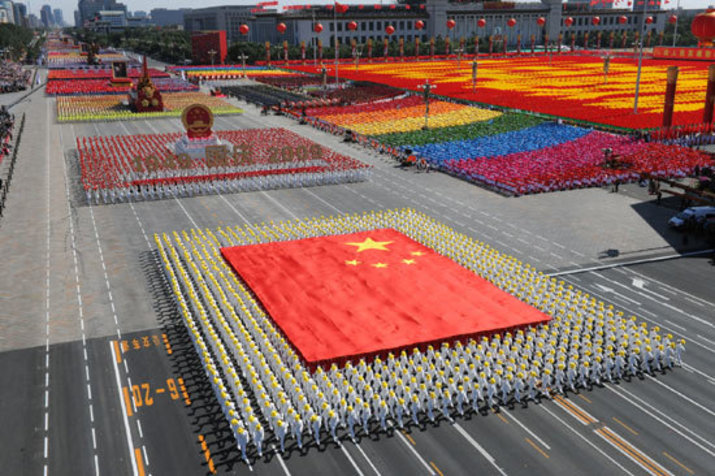 National flag inspection at Tiannan Square, Beijing, during the 60th anniversary of the birth of China's socialist government.
National flag inspection at Tiannan Square, Beijing, during the 60th anniversary of the birth of China's socialist government.
It is reported by other media outlets, such as the state-run Xinhua news agency, that this year's celebrations of the 70th anniversary will be the largest parade, by displaying the strength and growth of the Chinese military in terms of enhancements of advanced weapons and number of the military personnel, which is reported to be approximately 2 million. The preparations for the coming military parade have been well-rehearsed during the September month, it was affecting the local commute systems in Beijing, especially near the Chang'an avenue.
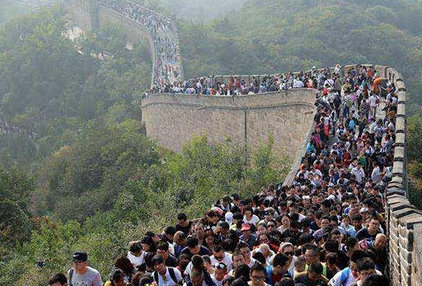
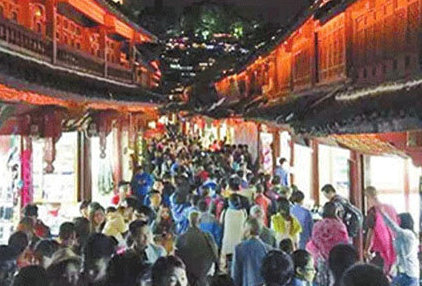
Travelling during national holidays such as the Golden Week from October 1-7 and Chinese New Year is not recommended as popular places will be crowded. The pictures speak for themselves (left: Great Wall near Beijing, right: Lijiang Old Town in Yunnan)
So what does the National Day in China mean for the average Chinese citizen?
Since the "Golden Week" is a public holiday, millions of citizens plan to travel home to visit the family or around China to see beautiful sceneries and explore exciting parts of China. Something to take into consideration is that the Golden Week is in autumn, thus the weather is ideal for outdoor activities and travelling. However, since many people tend to travel at the same time, plane tickets cost much more than usual, train and bus tickets will sell out within hours, and hotel bookings are also at a higher price. Tourist destinations tend to be crowdy and lengthy queues are a common phenomenon. It is usually recommended to avoid the most famous tourist sites altogether or to explore less popular places. Besides, on a good note, the weather around the first October tend to be favourable for travelling, because the rainy season in southern provinces is just over and in the northern parts of China, the weather is still comfortable enough for travel.
It is worth to take notice that the Chinese National Day is a relatively new holiday, compared to China's 5000 years history of cultural heritage. Since the holiday is not considered as a traditional holiday, the celebrations don't have any typical seasonal dishes served for this occasion. Typical activities are relaxing at home to avoid countless hours of traffic jam and hours spend queuing for a tourist site, or bravely facing the public holiday travelling to tourist spots. With the rapid pace of economic development in China, more and more people can afford to travel internationally as well, thus making nearby countries in Asia an option to visit.
Among domestic travellers, popular tourist destinations during the National Holiday of PRC are old towns of Lijiang and Dali. Thus, making those tourist cities crowdy during the Golden Week and less touristic sites are more recommended for those who want to experience China's sceneries. One week of a public holiday of millions of people traveling contribute to the tourist industry with billions of revenue, both locally and internationally.

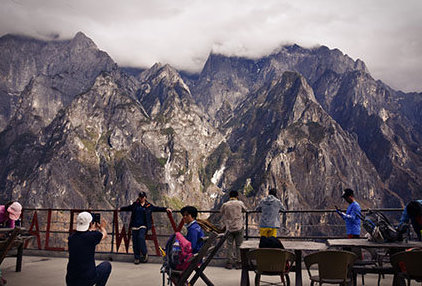
The Upper Trail of the Tiger Leaping Gorge was mostly empty when we hiked it during May 1st National Holiday this year. But at the guesthouses, it was busier than normally. Booking in advance is recommended.
If you really have no choice but to travel the first week of October, we would recommend in Yunnan to visit Shaxi or hike the upper trail of the Tiger Leaping Gorge, as Chinese tourists are much less likely to do that. Or travel past Shangri-La to Deqin and hike near Meili Snow Mountain in Yubeng valley. None of these places will be empty, but they will be much better than the Old Towns of Dali, Lijiang and Jianshui. Yuanyang will likely not be very busy, but October is unfortunately probably the worst time in the year to visit the rice fields, as this transition time between finishing the harvest and filling the fields with water leaves the paddies muddy and unattractive. In my first Golden Week in China in 2015 I climbed Mt. Emei. The long 2-day trail up and 1-day trail down were almost empty and absolutely amazing, but when you reach the cable car stations and the summit, it will be crowded. So, keep in mind, the best option is to go hiking or seek seclusion in a place with no convenient transport or cable cars. This includes Liming, but excludes Lugu Lake (which has an airport and is very popular with domestic tourists).
If you think Chinese cities such as Kunming will be drained of their residents – who will go back to their villages and home towns to visit their families – and it would be a great time to visit tourist attractions here, think again. It is true that the streets can seem to be void of people, but the attractions will not be less crowded.
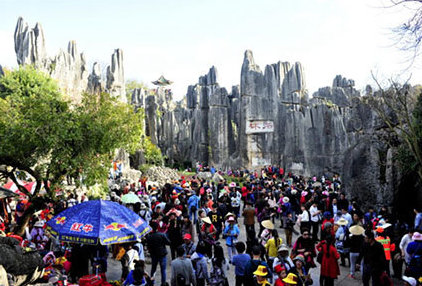
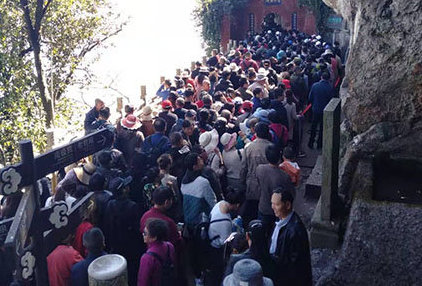
Do you think that visiting the empty cities during the holidays is a good idea? See for yourself the Stone Forest on the left and Western Hills on the right during Spring Festival. Golden Week will be similarly crowded.
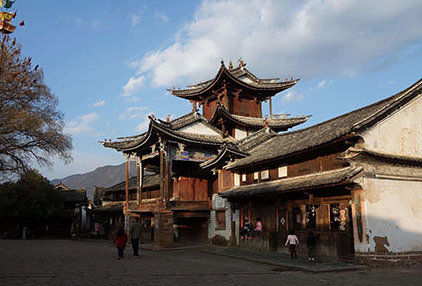

Visiting Shaxi Old Town or Laojunshan National Park in Liming near Lijiang are good options for travel in Yunnan during public holidays
Our office will be closed during Golden Week from Tuesday, October 1st until Monday, October 7th. We will be back on Tuesday the 8th. We wish everyone a happy 70th National Day Holiday and safe travels!
Further Readings
Kunming during Chinese New Year
The Great Spring Festival Crush
- 977 reads
- Like this







